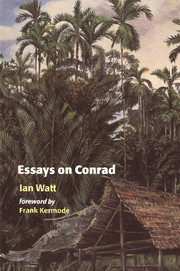Book contents
- Frontmatter
- Contents
- Foreword
- Acknowledgements
- Chapter 1 Joseph Conrad: alienation and commitment
- Chapter 2 Almayer's Folly: introduction
- Chapter 3 Conrad criticism and The Nigger of the ‘Narcissus’
- Chapter 4 Conrad's Heart of Darkness and the critics
- Chapter 5 Comedy and humour in Typhoon
- Chapter 6 The political and social background of The Secret Agent
- Chapter 7 ‘The Secret Sharer’: introduction
- Chapter 8 Conrad, James and Chance
- Chapter 9 Story and idea in Conrad's The Shadow-Line
- Chapter 10 The decline of the decline: notes on Conrad's reputation
- Chapter 11 Around Conrad's grave in the Canterbury cemetery – a retrospect
- Chapter 12 ‘The Bridge over the River Kwai’ as myth
- Index
Chapter 6 - The political and social background of The Secret Agent
Published online by Cambridge University Press: 22 September 2009
- Frontmatter
- Contents
- Foreword
- Acknowledgements
- Chapter 1 Joseph Conrad: alienation and commitment
- Chapter 2 Almayer's Folly: introduction
- Chapter 3 Conrad criticism and The Nigger of the ‘Narcissus’
- Chapter 4 Conrad's Heart of Darkness and the critics
- Chapter 5 Comedy and humour in Typhoon
- Chapter 6 The political and social background of The Secret Agent
- Chapter 7 ‘The Secret Sharer’: introduction
- Chapter 8 Conrad, James and Chance
- Chapter 9 Story and idea in Conrad's The Shadow-Line
- Chapter 10 The decline of the decline: notes on Conrad's reputation
- Chapter 11 Around Conrad's grave in the Canterbury cemetery – a retrospect
- Chapter 12 ‘The Bridge over the River Kwai’ as myth
- Index
Summary
The modern reader may find it useful to have some further information about the main historical source of The Secret Agent, the Greenwich Park explosion of 14 February 1894, and about Conrad's other sources for the novel.
This is not to imply that The Secret Agent is to be considered a novel about an actual historical event, in the sense that Josephine Tey's The Franchise Affair, say, is a fictional reconstruction of the mysterious Elizabeth Canning case in which Henry Fielding participated. For although Joseph Conrad's fiction nearly always started from some germ of reality – an anecdote, an historical event, an incident seen or a conversation overheard – by the time the work was finished it usually disclaimed any relation to actual persons, places or events. The germ of Lord Jim, for example, the desertion of the pilgrim ship, was a widely reported and notorious event; but in the completed novel Conrad tried to remove any details that tied it down to an identifiable place and time.
In The Secret Agent Conrad was hardly free to avoid specifying London and Greenwich as his locale; and he retained a good many of the actual details of the event. On the other hand, as the Author's Note says, after the initial challenge of his ‘friend's’ offhand remarks about the explosion, Conrad proceeded to develop the germinal cluster of ideas with the utmost imaginative freedom.
Conrad also steadfastly denied any detailed knowledge either of the explosion itself or of anarchism in general.
- Type
- Chapter
- Information
- Essays on Conrad , pp. 112 - 126Publisher: Cambridge University PressPrint publication year: 2000



